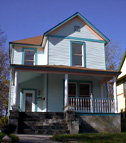|

1519 Fremont Street
1,777 sq. ft.
3 bdrms, 2 baths
$140,000
Contact: David Vogel
Owner: 524-3425
Comment
on this story
|
 |

by Matt Edens
The dreaded developer—he's almost a stock Hollywood villain; greedy and destructive, mowing down forests and bulldozing neighborhoods in a relentless quest to churn out tract houses and shopping malls. He's the enemy, the heartless outsider that neighborhood activists spend their time fighting, right?
Not exactly.
Sure, in some neighborhoods—single-family, owner-occupied, middle- and upper-income—the activism is largely defensive. The homeowners' association might plant a few flowers and spruce things up, but it's mostly about guarding the perimeter and keeping things out: apartment complexes, convenience stores, through traffic.
In the center city it's a little different. Sure, flowers are planted and trash picked up, and there will be the occasional zoning fight or request for KPD's help in combating traffic in the neighborhood (automotive or otherwise). But center-city neighborhood activists don't spend most of their time fighting developers. They become developers.
It happens almost by default. Let's say you've lived in the neighborhood a few years when suddenly that rundown house up the street—maybe it's a dilapidated duplex, maybe it's boarded up—comes up for sale. What are you going to do, sit around and wait for a new slumlord to buy it from the old one? No, you start shopping the house around, telling every friend who has ever admired your place how there's one just like it for sale down the street. Sometimes you get lucky and the house sells to someone who'll fix it up rather than milk it for cash flow (your chances vary, depending on the neighborhood). But sometimes, particularly when the house requires a lot of "vision" (like the ability to turn a blind eye to that hole in the roof) nobody comes through, and you're stuck with three options: a vacant lot, another round of absentee slumlord fun, or getting out the checkbook. (That last one, once again, depends on the neighborhood—kind of hard to write that check if all it'll do is bounce.)
Sometimes it's more than one checkbook. I'm part owner of the house a couple doors down from me, and I have several neighbors who went in together to buy two more houses around the corner. Such a grassroots collective makes it easier to think of the venture as something other than capitalism distilled down to its speculative-investment essence. Which is handy, since a lot of these developers by default aren't exactly chamber of commerce types.
The current owner of this house, for instance. A non-profit administrator by day, is an old family friend who, by his own account, spent a fair part of the '60s "throwing bricks at cops." Despite those counter-culture credentials, this is his fourth speculative real estate venture in Old North Knoxville. He bought the first house eight years ago, divided it into multiple apartments, lived in one and rented the rest, using the cash flow to fix the place up. Same goes for his current house—a duplex that he lives in half of. This house on Fremont is the second he's renovated for resale.
Capitalism aside, there's nothing staid about the renovation job. With the partition walls removed, the main floor combines living room, dining room and kitchen into a single large, loft-like space. The only things interrupting the flow are the kitchen countertop and the freestanding fireplace with exposed brick, of course, and complete with 30,000 BTU gas logs. The rafters and even the old gaslight pipes in the ceiling are also exposed. After all, who says a developer can't buck convention?

November 13, 2003 * Vol. 13, No. 46
© 2003 Metro Pulse
|





